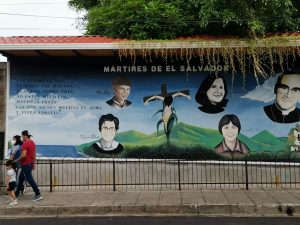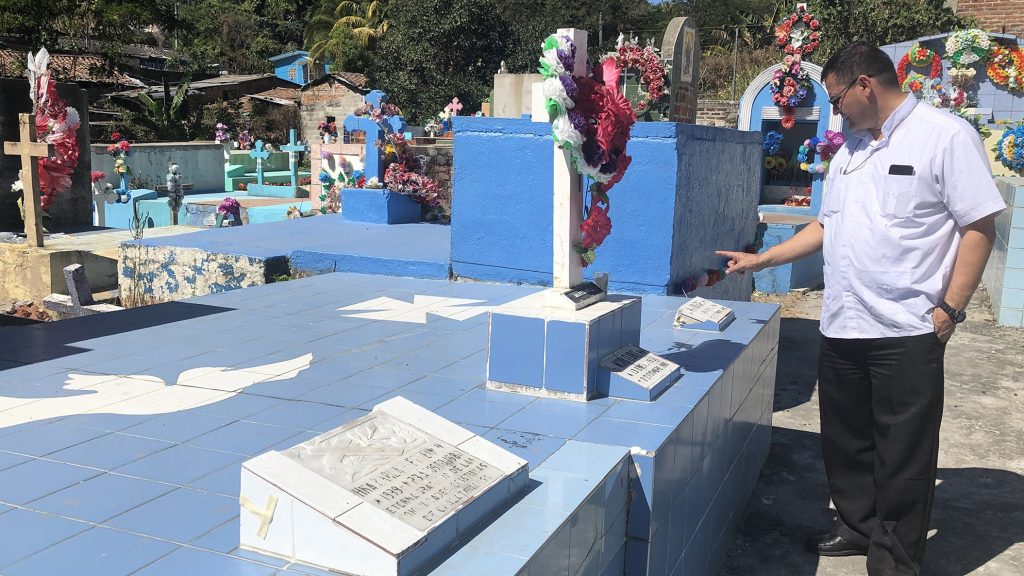On a bright and clear January afternoon, Bishop Oswaldo Escobar Aguilar walked into a cemetery and gently dusted off a white name plate on top of a sky-blue block of tombs. Making plans for the year ahead, he told secretary Violeta Esmeralda Serrano nearby that they needed to make sure the tombs were decorated with flowers Dec. 2.
That's the day when, in 1980, two of three U.S. Maryknoll sisters buried there were killed near the country's capital of San Salvador, along with two other American Catholic women. Though the killings came as a shock around the country and in the U.S., the loss of the Maryknollers was keenly felt in the Diocese of Chalatenango, in northern El Salvador, where the women lived and served. Maryknoll Sisters Maura Clarke and Ita Ford, along with Ursuline Sister Dorothy Kazel and lay missionary Jean Donovan, were raped and murdered by Salvadoran military as the civil war and the bloodshed among poor Catholic communities like Chalatenango ramped up.
Today, almost four decades after their deaths, the women are remembered, not because of how they died, but as examples of Christian lives well-lived, with the words "martyrs" and "saints" thrown about by those keeping their memory alive. They appear in murals of Salvadoran martyrs, such as the one in Zaragoza, in the department of La Libertad, where Sister Kazel and Donovan lived, and in the pages of a 2017 pastoral letter on the country's martyrs issued by Archbishop José Luis Escobar Alas of San Salvador.
Sometime in the 1980s, remembers Father Manuel Acosta, the community of Chalatenango began a quiet remembrance, with a Mass and procession on the day of the women's death, with particular interest in the Maryknoll sisters, tying it to the collective sacrifice of local Catholic martyrs.

"That's how Bishop Eduardo Alas Alfaro wanted it," Father Acosta told Catholic News Service in an Aug. 25 interview recalling the mandate from the first bishop of Chalatenango, who insisted on finding a way to honor the sisters. "He wanted it to be the day of the assassination of the Maryknollers and he said, 'This is the way we'll preserve their memory.'"
That was not an easy undertaking during the war. Chalatenango -- poor, rural and whose residents were often suspected of siding with leftist rebels -- often was the target of bombings and massacres during the country's 1980-1992 war. More than 50 massacres are believed to have taken place there.
After a letter requesting more Maryknoll Sisters by then-Archbishop Oscar Romero of San Salvador, the order increased its presence in the country, even as civil conflict started, and among the hungry, exploited masses of predominantly Catholic Chalatenango, Sisters Clarke and Ford were sent to lead Bible study groups. Though Donovan and Sister Kazel lived in another part of the country, they often traveled to Chalatenango, meeting and organizing with Sisters Clarke and Ford, to transport food, medicine and sometimes wounded children to safety.
Sister Carla Piette, the third Maryknoll Sister buried in the Chalatenango cemetery, also served there but drowned Aug. 23, 1980, after losing control of the car she was driving following a flash flood.
"They were loved. They were good sisters," recalled Father Marcos Tulio León, pastor of Immaculate Conception parish in Nueva Concepción, who attended Sister Piette's funeral. "They worked with the poor with complete surrender."
In diary entries and letters read in the 1982 documentary "Roses in December," Donovan, trained as a lay missionary via a Maryknoll program, chronicled the violence of the region in mid-August, just months before her death, and spoke of bodies found along the road, helicopters, trucks and soldiers. She observed that "Chalatenango is just absolutely civil war at the moment." A few weeks before she died, she spoke of wanting to leave El Salvador, but felt unable to do so because of the children, "the poor bruised victims of this insanity."
"They (the women) came to embody the Salvadoran reality, they came here to be poor, to be persecuted, they came to endure what all the poor endured at that time, which was persecution," said Father Acosta. "They left their culture, they left their comfort, and they came here to live the daily life of the poor. Then, they were washed away by rivers. They were subjugated to (police) searches many times, until they were killed."
Even in death, they endured the impunity of crimes committed against the poor in the country, said Bishop Escobar. U.S. government officials, who were supporting -- financially and otherwise -- the repression of El Salvador's government at that time, even suggested that the Catholic women could have been at fault, calling them "activists" and later suggesting that they may have run a roadblock leading to their deaths -- not taking into account their rape. Their bodies were found after they were shot execution style in the back of the head, stacked on top of one another in a shallow grave.
Though the bodies of Sister Kazel and Donovan were returned to the U.S., Sisters Ford and Clarke were buried in El Salvador, in keeping with Maryknoll practice.
"They could have lived in better (economic) conditions in their native country than here, but, not only did they show solidarity with the poor, but also suffered the same fate as the poor, the thousands of murdered catechists, delegates of the Word, at the hands of a bloody repression," Bishop Escobar said in a Sept. 2 CNS interview. "They were victims, we could even say, of the weapons of their own country, the country they were from, because back then, our armed forces received practically all military funding from the United States."
Though they may have been born in the U.S., the bishop said, they were, first and foremost, committed Christians who chose to serve the people of Chalatenango.
"They were characterized by that service in our country and those who lived in Chalatenango as well," he said. "In fact, we celebrate on Dec. 2 the thousands of martyrs of Chalatenango in honor of them and chose that date in honor of them (the U.S. women) and accept them as martyrs of Chalatenango, along with the thousands who died here."
He said that even though it's not under his purview to officially declare anyone a saint, he believes Chalatenango, where the women are buried, is home "to these great saints, which, to me, they are because they were martyrs, because they lived out the Gospel of Jesus Christ to the most extreme of consequences."
If you look at church history, he said, the first saints were martyrs, and the early Christians venerated them as such. But because they belonged to different orders, different dioceses, countries, one was a layperson -- opening a cause of canonization and under whose jurisdiction can be a complicated matter, the bishop said.
But Father Acosta said, "Our people have already canonized them."
"If Rome wants to speak on that matter, it can speak on that matter. But I don't doubt that they're saints, that they're martyrs. To me they are the martyred women of 1980," sharing the same year of martyrdom as Archbishop Romero, who's now officially a saint, he added.
Though the COVID-19 pandemic brought the 40th anniversary commemoration of St. Romero's martyrdom to a halt in March, Chalatenango said it will continue with plans to mark the 40th anniversary of what it calls the women's martyrdom, including its annual Martyrs of Chalatenango Mass, a blessing of the Maryknoll Sisters' tombs and perhaps a bilingual program via livestream on its Facebook page as part of a digital pilgrimage for those who can't make it.
"For us, it's important that those in the U.S. understand that they (the women) were martyred for the Gospel," Bishop Escobar said. "And there have been true saints in these times in history, from the U.S., as these women were."

